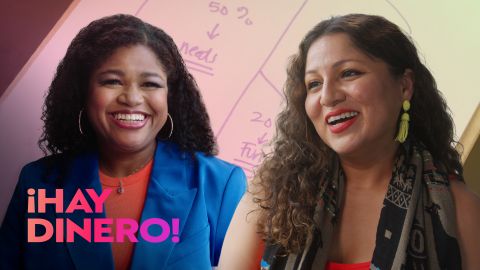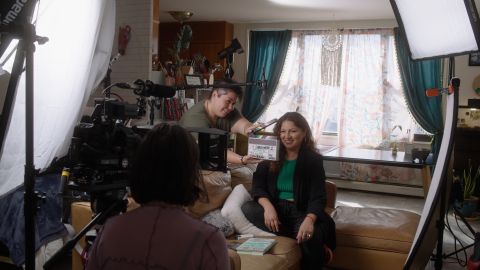A Father-and-Child Team Confronts Teen Mental Health Stigma
By Shannon Damiano and Emily Sauchelli
This story mentions mental health issues, suicidal ideation, and self-harm. If you or someone you know is struggling or in crisis, help is available. Call or text 988 or visit 988lifeline.org. This service is free, confidential, and available 24/7.
In honor of Mental Health Awareness Month, we bring to your attention the newly released podcast series “Conversations with Sydney,” whose content is informative, moving, and inspiring.
Each episode is structured as a personal conversation between father/journalist/filmmaker Micah Fink, and his nonbinary teenager Sydney, a musician and artist who is currently a high school junior. Their conversations, which include interviews with experts, explore effective ways for adults and teens, as well as schools and communities in general, to respond to the ongoing crisis in teen mental health and suicide.
Micah and Sydney recently spoke to Chasing the Dream about a variety of topics, including what motivated them to create “Conversations with Sydney,” how to talk to teens about mental health, and how to access mental health support for adolescents in need.
The following interview has been edited for clarity and length.
Skimming for quick answers to questions about children’s mental health? Click these links to skip to interview highlights:
The process of creating the podcast “Conversations with Sydney”
SHANNON DAMIANO: When we first started contemplating interviewing you both about “Conversations with Sydney,” I was excited, but I was also feeling a little uncomfortable about discussing these heavy topics. This discomfort that I, and probably a lot of people, have about discussing mental health seems to be a big reason why you both are doing the podcast. Would you like to talk about that a little bit more?
MICAH FINK: I think you’re right. I think most people are uncomfortable. I was uncomfortable.
SYDNEY FINK: It’s uncomfortable. It feels personal and it feels private. And I think that discomfort is – and the idea that you have to fix yourself and fix your own problems – is just really harmful. If you keep it to yourself, you’re going to keep hurting. And if other people are afraid to talk about it, then everybody’s going to live in their own little isolated bubble. And that’s not really going to fix anything.
EMILY SAUCHELLI: Micah and Sydney, how did you decide to do a podcast together?
SYDNEY FINK: I noticed that a lot of my friends were talking about suicide and that I was also thinking about it, or self-injury, a lot. And I asked my dad, “Is this normal?” And he had no idea how to answer the question – or if he should. Dad’s a journalist, so I guess his first instinct was to make a podcast. And we figured a podcast would be more fun. It would be easier for people to access.
MICAH FINK: As a parent, it’s sort of stunning and staggering and frightening. As Sydney said, I looked online, and I really couldn’t find any resources for addressing parents of teens who are thinking about these things or talking about these things. And that conversation became sort of the very beginnings of this. As we started working on it, Sydney and I also took a course in suicide prevention. And it became pretty evident that there was a lot that could be done. So, we were hoping that we can ease the path for other folks who may be going down these roads. And remarkably, as we started telling people that we were doing this, almost everybody that I talked to said they had a brother or sister or a child or a cousin, who has gone through something similar.
SHANNON DAMIANO: Micah, as you tell it in the podcast, you and Sydney can pretty much talk about anything with each other. How did you feel when Sydney brought up that a lot of their friends at school were talking about suicide and self-harm?
SYDNEY FINK: I said, “I’m worried that my friends won’t graduate high school.”
MICAH FINK: And I was like, “Why? Aren’t they studying?”
SYDNEY FINK: No, they’re not going to survive.
MICAH FINK: And Sydney took it to a whole other level. I didn’t know if you should talk to your kids about suicide. I – like many people I think – had that mistaken belief that if you talk about it, you encourage it or you somehow legitimate the idea or you might make it worse. Where I started was with that question: “Should you even talk to your kids about suicide if they raise it?” And I think the answer we found is, “Yes, you definitely should. Because if you don’t, they’re still talking about it.”
EMILY SAUCHELLI: Sydney, how did it feel to work on this project with your father?
SYDNEY FINK: I feel less alone. I also feel more secure when I’m talking with people, with my friends who are going through similar things, because I know that there is a recommended way to help people.
EMILY SAUCHELLI: And what about you, Micah?
MICAH FINK: I’ve enjoyed it. Sydney is funny. It sometimes gets a little heavy. You know, again, going back to the name, I think part of the solution is conversation.
EMILY SAUCHELLI: How has your relationship evolved over the course of this project?
SYDNEY FINK: I think there’s a bit more trust. Not that there wasn’t before, but I’m more comfortable talking about things that are a bit more serious. And I feel like we can be a bit more open.
MICAH FINK: Yeah, and I’m glad to have the conversation, Sydney. What could be more important to talk to your kid about than their life, their experience, their inner world?
The numbers of kids who are thinking about suicide now, it’s more than 22%. Or one out of every five high school students seriously considered suicide, according to the CDC, last year. And those numbers have only risen over the last 15 years.
What we’re hearing is that depression and suicidal ideation looks different in younger kids, but it’s not uncommon. And kids as young as five, six, seven can have really, really dark feelings.
Some causes of the current teen mental health crisis
SHANNON DAMIANO: It’s no secret that the teen mental health crisis has worsened a lot in recent years. I see a lot of articles pointing to the pandemic as a huge stressor for teens. Do either of you have any insight into the causes of this teen mental health crisis?
SYDNEY FINK: I think there are a lot of different factors that are sort of all interwoven and playing a part. I know people are quick to point a finger at social media and then people my age are quick to defend it. But I think honestly, [with] social media and the internet, you’re always comparing yourself to everyone else and you’re always seeing only the best parts of everyone else’s lives. It all sort of compounds. But also just the fact that there’s so much going on in the world. There’s, you know, the climate crisis, the war in Ukraine, transphobia, homophobia. At least from my perspective, via the internet, you can just see that everything is happening at the same time and it’s just so overwhelming.
MICAH FINK: It’s a society filled with loneliness. I think we prioritize individuality to the point where the ideal dream is to go off, get a house in the suburbs where you just have your own little universe. That breaks most of the social connections that have sustained people. But I think there are a lot of things going on. What we hope to do in the podcast is explore these factors. Is there anything that can be done to make people feel less isolated and alone and sad? And one of the solutions I’ve heard is being an activist, being engaged, actually makes you feel better. And I think that’s one of my secret reasons for doing this podcast. I think it makes us feel better.
Ideas for future episodes of “Conversations with Sydney”
SHANNON DAMIANO: Do you both plan to create more episodes of the podcast?
SYDNEY FINK: We have the next eight episodes or so blocked out and then we’re thinking this could continue. Hopefully, until I’m done with high school and then maybe even beyond that, when I’m in college.
SHANNON DAMIANO: In these future episodes, what are some topics you hope to – or are planning on exploring?
SYDNEY FINK: Because we’re a white family from the suburbs, we want to look at the different perspectives from different ethnic communities. We want to broaden this and make it applicable to everybody and find different lenses and different people to talk to.
MICAH FINK: We would like it to be filled with voices of people really who are experiencing this themselves to help us to understand what it is. The queer community has much elevated rates of suicide and suicidal ideation. Black girls and boys – their rates are rising dramatically right now.
Generational approaches to suicide
EMILY SAUCHELLI: Micah, in the podcast you said, “I don’t remember talking about suicide in the schools when I was growing up in the 1970s.” As a parent, what has your experience been while learning how to navigate talking more openly about suicide and mental health?
MICAH FINK: I think it freaked some people out. It’s such a taboo subject and is considered such a private, disgraceful topic that a lot of people would never bring it up themselves. But once you raise the issue, everybody has a lot to say. And a lot of very intense experiences.
EMILY SAUCHELLI: How important is it for you both to reach families caring for loved ones who are dealing with various mental health conditions?
SYDNEY FINK: I think that’s the first priority. We just need to reach as many people as we can.
MICAH FINK: That’s why we’re doing this. I was hoping to also reach teachers. Teachers are often the next available adult on deck interacting with kids. We’re a little surprised that some of the schools we’ve reached out to discuss this with, don’t want to talk about it publicly. And yet that’s the major resource for dealing with this, if you can’t deal with it in the family. So, we’re hoping that we may help to influence behavior in that sphere as well.
Advice on how to approach suicidal ideation
EMILY SAUCHELLI: What advice do you both have for adults who are hearing their child talk of suicide for the first time?
SYDNEY FINK: Listen to your kid. Don’t freak out. The first thing is, don’t overreact. One of the first times I brought it up in regards to myself, Dad had a really big overreaction. And I sort of shut down and took that as, okay, I can’t talk about this. And it was just because he was worried for me. So even if you don’t know exactly what to do firsthand, stay calm and say, “Let’s figure out what to do together.”
MICAH FINK: As a parent, your reaction is just so important. Because it will either open up a conversation or close it down.
SYDNEY FINK: A lot of times parents might take it pretty personally. Like it’s a rejection of them. But it’s about your kid. It’s not about you. And if you’re a parent, you should be involved in trying to help them find a solution.
EMILY SAUCHELLI: How can adults and loved ones be more aware of signs related to suicide?
SYDNEY FINK: Just paying attention to their kids in general. The first thing is to watch for any major changes in their behavior.
I think for a lot of people, especially nowadays with social media, it’s really easier to feel like you’re isolated. Acknowledging people more than we normally do and saying, “Hey, you look a little down. Are you okay?” Or just some form of acknowledgment about the personal life of a friend or family member or student or a colleague. I think that’s really important. I feel like even just smiling at someone in the hallway sometimes that can turn my day around.
Educational resources related to “Conversations with Sydney”
SHANNON DAMIANO: Would both of you like to talk a little bit about the educational resources that have been created to support this podcast? Who are they addressed to? And how do you hope they’ll be used?
MICAH FINK: I should say that this project really only exists because The Rosalynn Carter Fellowships for Mental Health Journalism made me a fellow and gave me a grant to do some of the work, and so did the Pulitzer Center on Crisis Reporting. And I’ve worked with the Pulitzer Center a lot over the last ten years. And part of what makes what they do so powerful is, they not only fund reporting, but they also create educational resources and outreach to both high schools and colleges. Part of what they have brought to this project is a listening guide for each episode that helps K-12 teachers engage with the podcast.
We’re going to be doing an event sponsored by the Pulitzer Center with the Jed Foundation. Laura Erickson-Schroth, who is their chief medical officer, is going to be engaging in a Zoom conversation with me and Syd.
SHANNON DAMIANO: What do you both hope for when you think of the future of mental health care for teens and adolescents?
SYDNEY FINK: Making it more accessible, reducing the stigma and helping people to know that they’re not alone and that there are actually solutions and answers and finding healthy ways to cope with things that a lot of people are going through.
MICAH FINK: Yeah, what they said.
The podcast “Conversations with Sydney” was produced with support from the Pulitzer Center on Crisis Reporting, The Rosalynn Carter Fellowships for Mental Health Journalism, and in association with WBGO Studios. You can listen for free on Apple Podcasts, Spotify, the NPR app, Amazon Music and Overcast.
Micah Fink is an award-winning filmmaker exploring the intersections of science, public health, human rights, international affairs, and the environment. His work has received three Emmy nominations, two Cine Golden Eagles, an Amnesty International Human Rights Film Award, a Silver Telly Award, and multiple best picture and audience awards at film festivals around the world. He teaches in the MFA Program in Social Documentary at the School of Visual Arts in NYC.
Sydney Fink is a teenage artist and musician living in New Jersey.
Shannon Damiano is an East-Coast-based journalist and production assistant for Chasing the Dream. Her work can be found in The Coast Star, The Ocean Star, The Cambridge Chronicle, The Daily Free Press and other publications. She is a producer on “The Sweaty Penguin,” an environmental-comedy podcast presented by Peril & Promise. Shannon graduated from Boston University in 2022 with a degree in journalism.
Emily Sauchelli is a production assistant for Chasing the Dream and Peril & Promise. She holds a Bachelor of Arts in Journalism from Hofstra University. Her work has been featured in Livestrong.com, The Haitian Times, The Mott Haven Herald and other publications. She is on her way to completing her master’s degree in journalism, with a concentration in health and science reporting, at the Craig Newmark Graduate School of Journalism in New York City.



